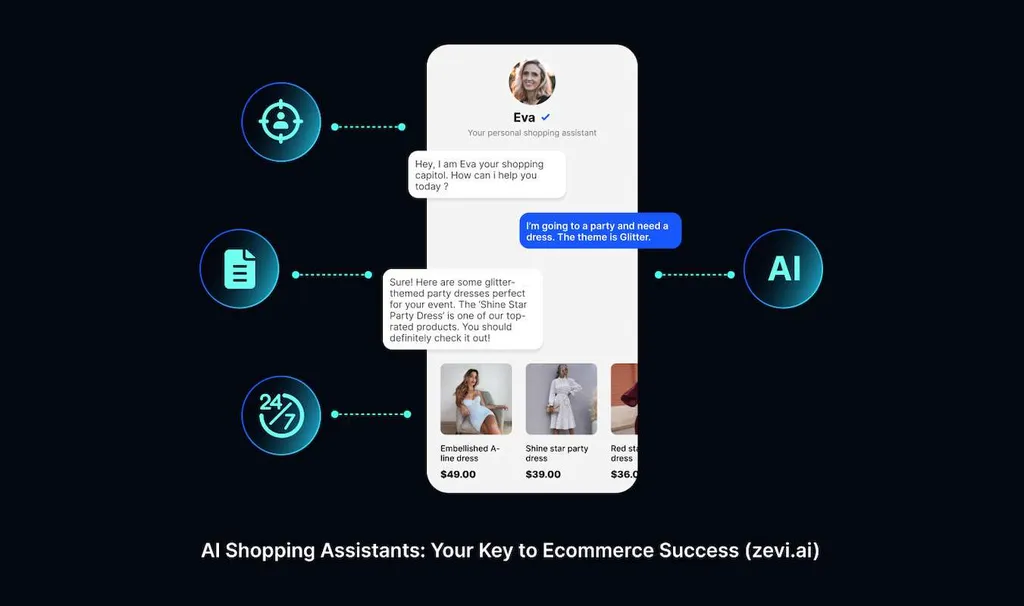Personalization of online shopping allows companies to retain clients and build a strong brand image. An AI shopping assistant integrated with a legacy system reduces response times, automates simple queries, expedites resolution, and increases satisfaction.
As there are so many eCommerce platforms to choose from, customers are more inclined to rely on the services that provide 24/7 support guiding them on every step of a buyer’s journey. The development of Artificial Intelligence (AI) technology signified a pivotal shift in customer support (CS) workflows. Read on to discover how algorithmic tools can transform your online e-commerce business.
What Is an AI Shopping Assistant
Pre-programmed chatbots are designed to help users discover products and buy them online. They are built to provide context-relevant replies and recommendations based on a buyer’s shopping habits. Virtual assistants perform tasks of different complexity. Some in-built widgets and plugins perform similar tasks, but their functionality remains limited compared to advanced AI bots.
Some of them supply buyers with essential info about listings. More complex bots leverage the power of conversational AI to generate replies to more challenging queries. They can solve shopping cart issues or help a buyer to finalize the checkout stage.
At first, most AI assistants for eCommerce were text-based, but with the development of speech recognition technology, their functionality has significantly improved. According to the stats, over 27% of U.S. shoppers rely on voice assistants. In most cases, people utilize bots to navigate through product catalogs. However, online-based helpers also perform such tasks:
- Provide recommendations and special discounts
- Send reminders about steps necessary for order finalization
- Track shipping
- Answer to tickets
Despite the time-tested effectiveness of AI bots, many businesses are still reluctant to integrate them into their workflows. Nevertheless, as it becomes arduous to meet the needs of discerning customers, companies should prioritize enhancing customer experience (CX).
MetaDialog integrates custom AI assistants into traditional CS workflows. Based on custom Large Language Models (LLMs), such tools enable firms to automatically reply to 87% of all queries. By generating high-accuracy replies, bots can increase the satisfaction rate by up to 28%. There are other advantages to implementing AI solutions as well.
Why Use AI Shopping Assistants?

With over 26.6 million web-based retail platforms worldwide, gaining an edge over competitors becomes increasingly difficult. Most clients remain loyal to brands that care about their preferences and needs. Using AI bots to engage customers with natural-sounding conversations is one of the best ways to win client’s trust.
The main reasons to integrate virtual assistants include:
- Improved navigation: Finding a specific item in a large store may be challenging. AI bots make this process less tedious, as they are trained to discover information and engage customers in a conversation.
- Fewer abandoned shopping carts: When a client has second thoughts because of a price, a bot may detect the signs pointing at a change of heart and quickly answer questions that may interest the customer or offer a discount.
- Cross-selling opportunities: Firms no longer need to send thousands of emails to drive clients to purchase related offerings. Online helpers analyze user behaviors and suggest relevant items like accessories and clothing.
- Reduced expenditure: Automated systems enable enterprises to spend less on CS and marketing. An artificial intelligence assistant enables shoppers to discover product details without chatting with a human CS agent. After communicating with MetaDialog’s chatbots, 60% of customers refuse further human support as their issues get solved quickly. Marketing professionals utilize insights collected by chatbots and engage new buyers more efficiently. While such solutions require initial investments, they save money in the long run.
- Service provision across multiple communication channels: Omnichannel assistants have access to a client’s history of interactions and provide replies based on the information they receive. This contributes to an enhanced UX.
- High conversion rate: Virtual assistants study preferences and make targeted offers when serving first-time buyers. It enables companies to improve lead acquisition and retention.
The undisputed advantages of AI-driven online helpers drive firms to discover new use cases and deploy algorithm-based solutions to expedite operations.
Examples of Using AI Shopping Assistants

Global corporations have already successfully implemented AI solutions to improve CX. Providing top-quality services now involves using automated systems capable of providing relevant information without delays. Below, we have outlined the most effective examples of deploying such tools in eCommerce:
- Voice-ordering systems: Walmart has built a powerful solution that integrates with Siri and Google Assistant, which allows buyers to place orders using voice commands.
- Shop bots with search and comparison tools: eBay introduced an AI bot that helps buyers discover products, compare different offerings in terms of pricing, and finalize purchases. It leverages natural language processing technology to grasp the subtle nuances of queries.
- Augmented reality solutions: Sephora introduced a Virtual Artist that allows customers to try on makeup and get personalized recommendations.
- Style match tools: ASOS was one of the first companies to offer a tool that analyzes pictures of clothing items and suggests matching products.
Even though many people would still go to physical stores, AI assistants make the online shopping experience more engaging and enjoyable.
How to Integrate AI Shopping Assistants
Building a chatbot or other types of virtual helpers is a laborious process. If a company decides to entrust implementing AI models to a third-party provider, it should follow such steps:
- Write down all requirements to get a custom solution built to meet its needs;
- Provide high-quality data to train the AI model;
- Indicate what services and platforms the AI assistant should integrate with;
- Fine-tune the performance of the AI bot to ensure it will be able to handle complex conversation scenarios;
- Monitor the performance and response rates to discover the bots weak points.
MetaDialog’s systems integrate with Zendesk, Intercom, and popular messengers, which allows companies to provide assistance across multiple communication channels. Their integration can improve a CS team’s productivity by five times.
How to Overcome Common Challenges
When choosing the right AI shopping assistant, firms face multiple issues. Making the right choice requires comparing the available offerings in terms of features, prices, and integrations. Selecting a product built by a reliable developer is the only way to adhere to data protection regulations and get a custom model trained on large datasets. Before implementing such solutions, companies should consider other problems as well:
- Integration: It may be arduous to build a reliable AI bot and train it to perform complex tasks without hiring a team of experienced engineers with a strong technical background. Outsourcing this task to MetaDialog helps companies avoid problems that may arise and spend less valuable resources.
- Data protection: AI assistants analyze large volumes of buyer data. Misusing this information may lead to serious consequences, including legal prosecution, fees, and reputation loss.
- Price: Building and integrating AI assistants requires significant financial resources. A company should accurately estimate ROI before investing in new technologies to avoid putting a strain on its budget.
- Buyer preferences: Some customers may be wary of getting support from virtual helpers. Training AI bots to maintain a human-sounding conversation allows companies to build trust. MetaDialog builds LLMs capable of recognizing cultural cues and adapting their behavior to provide personalized services.
- Upgrades: AI models can learn after analyzing conversations with buyers and improve their performance. However, firms should also invest in their development and maintenance.
Recognizing these issues allows firms to come up with a viable implementation strategy and make the most out of AI tools. A failure to consider possible implications of data misuse and address other related problems may hinder the adoption and prevent a firm from building a result-yielding development strategy.
Integrating an AI shopping assistant with a legacy system is the only way forward for companies seeking to enhance CX, boost profits, and enhance the retention rate. MetaDialog caters to the preferences of eCommerce businesses from different niches and builds custom products designed to provide top-quality shopping assistance. Contact our experts today to learn how to entice online shoppers and demonstrate the selling points of your brand’s offerings.
